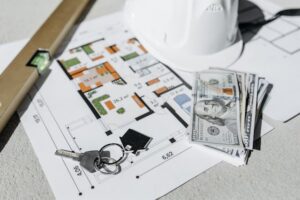When buying a house, it’s crucial to understand that it goes beyond just a down payment.
To ensure you’re financially prepared for homeownership, it’s essential to consider all the expenses involved in the process.
While the focus often centers around the purchase price, there are numerous other costs you’ll need to account for.
In this article, I’ll delve into ten key expenses to keep in mind when you’re planning to buy a house.
By understanding and budgeting for these expenses, you can ensure a smoother and more financially secure home-buying experience.
So, are you ready to embark on the exciting journey of buying a house?
Use this list to fully prepare for the exciting journey of homeownership.
1. Down Payment

When buying a house, you’ll need to make a down payment, typically a percentage of the home’s purchase price.
For example, if you’re eyeing a $250,000 house and your lender requires a 10% down payment, you’ll need $25,000 upfront.
Explore ways you can own less and live more to ensure you don’t spend beyond your budget for a home.
2. Closing Costs
Closing costs include various fees associated with finalizing the home purchase, such as loan origination fees, appraisal fees, attorney fees, title insurance, property taxes, and other miscellaneous expenses.
For a $250,000 home, you might expect closing costs to range from $5,000 to $12,500.
Closing costs are also part of a lawyer’s house purchase costs.
3. Home Inspection

Before closing the deal, it’s crucial to have a professional home inspection to identify any potential issues with the property.
You should budget around $300 to $500 for a home inspection.
For instance, a home inspection might uncover the need for costly repairs like a new roof or HVAC system.
4. Appraisal Fee
Lenders require an appraisal to determine the home’s market value.
You typically pay the cost of the appraisal which can range from $300 to $500, depending on the size and location of the property.
For example, if you’re buying a $250,000 home, you’d likely pay around $400 for the appraisal.
This is also one of the costs associated with selling a home in case you have one for sale.
5. Homeowners Insurance
Homeowners insurance protects your investment in case of damage or loss due to fire, theft, or other covered events.
The cost of homeowners insurance can vary significantly depending on the location, size, and condition of the home.
For example, you might pay anywhere from $800 to $2,000 per year for homeowners insurance, depending on your home’s value and location.
Explore how to get cheap car insurance in Canada to draw some insights.
6. Property Taxes

You’ll owe property taxes to local governments.
The amount depends on the assessed value of the home and the local tax rate.
For example, if you’re buying a $250,000 home in an area with a 1% property tax rate, you’d owe $2,500 in property taxes per year.
7. Private Mortgage Insurance (PMI)
If your down payment is less than 20% of the home’s purchase price, your lender may require you to pay for private mortgage insurance (PMI) to protect them in case you default on your loan.
PMI typically costs between 0.5% to 1% of the total loan amount annually. For example, if you’re buying a $250,000 home with a 5% down payment, you might pay $1,250 to $2,500 per year for PMI.
Here is a list of 10 Tips To Get The Cheapest Mortgage in Canada.
8. Homeowners Association (HOA) Fees
If you’re buying a home in a planned community or a condominium, you may be required to pay homeowners association (HOA) fees.
These fees typically cover the cost of maintaining shared amenities like parks, pools, and common areas.
For example, you might pay $100 to $500 per month in HOA fees, depending on the services and amenities provided.
9. Utilities

Don’t forget to budget for monthly utility expenses like electricity, gas, water, and trash removal.
The cost of utilities can vary depending on factors like the size of the home, local climate, and energy efficiency of the property.
Yet, these are some of the small changes that make a big difference in the environment.
For example, you might expect to pay $100 to $300 monthly for utilities, depending on your usage and the local rates.
10. Maintenance and Repairs
Finally, you should budget for ongoing maintenance and repairs. Even new homes will require regular upkeep, such as lawn care, HVAC system maintenance, and occasional repairs.
For example, you might need to budget $1,000 to $2,000 annually for maintenance and repairs, depending on your home’s age and condition.
Wrap-up
Buying a house involves more than just the purchase price.
By considering these ten expenses, you can better prepare yourself for the total cost of homeownership and avoid any financial surprises down the road.
Don’t forget to create a comprehensive budget that includes all these expenses.
Being financially prepared is the key to successful homeownership.